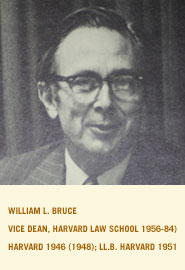

Community

“Earlier in my life, I found a door of opportunity cracked open by many giants in Oklahoma and I escaped through it from what otherwise might have been. I owe it to those who paved my path to be a worthy vessel for the blessings they poured into me, by multiplying those blessings and passing them on to others.
Dean Bruce had faith in me and helped me at a fateful crossroads during my legal education. The Bible speaks of the several lepers who were healed and the one who returned to express thanks and gratitude. I have not seen Dean Bruce in decades and he is full in years by now. But, lest I be as one of those healed who did not return, I wanted to use this vehicle to say thank you.”
Robert H. Alexander, Jr. (HLS ’76)The Law Office of Robert H. Alexander, Jr., p.c. has established a $100,000.00 endowment to be used for minority law student scholarships at the University Of Oklahoma College of Law in honor of former Harvard Law School vice dean William L. Bruce (HLS '51). This endowment makes the Alexander firm by far the largest single sponsor of minority legal scholarships at Oklahoma's largest law school. The Alexander law firm will also annually hire and mentor two OU law students as legal interns for the firm, which defends Fortune 500 companies against product liability claims throughout the United States.
The Alexander firm's principal, Robert H. Alexander, Jr. (HLS '76) said he was moved to endow the scholarships at Oklahoma University Law School rather than Harvard Law School from which he graduated, because the need for such scholarships in Oklahoma is greater and because:
“Earlier in my life, I found a door of opportunity cracked open by many giants in Oklahoma and I escaped through it from what otherwise might have been. I owe it to those who paved my path to be a worthy vessel for the blessings they poured into me, by multiplying those blessings and passing them on to others.
Dean Bruce had faith in me and helped me at a fateful crossroads during my legal education. The Bible speaks of the several lepers who were healed and the one who returned to express thanks and gratitude. I have not seen Dean Bruce in decades and he is full in years by now. But, lest I be as one of those healed who did not return, I wanted to use this vehicle to say thank you.”
The Law Office of Robert H. Alexander, Jr., p.c. and the firm's attorneys are comprised of Blacks, Whites, Hispanics, men and women. Yet, the Alexander firm's commitment to diversity does not end merely with the firm's commitment to itself.
The University of Oklahoma has played a pivotal role in educating African American lawyers in Oklahoma and played a key role in the progress which has been made in providing legal education to minorities, since the law school was integrated by Ada Lois Sipuel and her attorney Thurgood Marshall.
When the United States Supreme Court ruled in 1948 in Sipuel v Board of Regents that the State of Oklahoma must provide a legal education within Oklahoma to its Black citizens as long as it provides such an education to its White citizens, the Oklahoma Board of Regents (of which Ms. Sipuel would one day be a member) responded to the Court's mandate by ordering that a small section in the State Capital Building's basement be roped off for colored students and assigning three law teachers to attend to the instruction of Ms. Sipuel “and others similarly situated.”
Ms. Sipuel refused to dignify the sham law school with her attendance. When Mr. Marshall then argued to the United States Supreme Court that the roped off basement law school defied the Supreme Court's mandate, the Court ruled that the original Sipuel case “did not present the issue of whether a state might satisfy the equal protection clause . . . by establishing a law school for Negroes.“
Ms. Sipuel therefore did not attend the University of Oklahoma Law School until Sweatt v Painter was decided several years later in 1950 and for the first time, the Supreme Court ordered a Black student admitted to a school previously for White students on the ground that the colored school established by the state failed to offer equal educational opportunity. Only a few months ago, a University of Oklahoma Law School graduate became the first Black justice of the Oklahoma Supreme Court. As he took the oath of office in the courtroom located on the State Capital Building's second floor, Justice Tom Colbert noted that it had taken more than fifty years for Blacks as a people to get from the basement of the capital to the second floor. As Mr. Alexander witnessed the completion of that journey from the basement to the second floor, it was a day of unspeakably great joy-a day Mr. Alexander says he thought he would never live to see. Yet, much remains to be done.
Mr. Alexander says: “The University of Oklahoma Law School will always be the premier producer of lawyers in Oklahoma-and with the proper support, the premier producer of Black lawyers. The Alexander firm's minority law scholarship initiative in honor of vice dean William L. Bruce-- made possible through the equal opportunities afforded us by our clients -- helps that law school and the graduates it produces keep alive the worthy legacy we have all inherited which helps us make moral payments on an obligation to those who made the Alexander law firm's existence and success possible.”